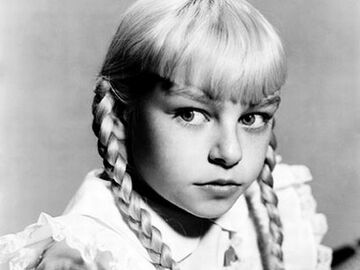Rhoda Penmark (not seeming to understand the significance of her classmate Claude Daigle's murder).It was Claude Daigle who drowned. Not me.
Rhoda Penmark is the eponymous main protagonist of the 1954 novel The Bad Seed, and its 1956 film adaptation of the same name. She is a murderous, sociopathic 8-year-old girl who kills a classmate because he won an award she coveted.
She was portrayed by Patty McCormack in the 1956 film.
In the 1985 made-for-TV remake, she is renamed Rachel Penmark and portrayed by Carrie Wells.
In the 2018 made-for-TV remake, she is renamed Emma Grossman and portrayed by McKenna Grace. (Patty McCormack has a cameo as Emma's therapist.)
Personality
Rhoda is portrayed as a psychopath, although the term was not widely used at the time the book was written. While intelligent and superficially charming, she has no conscience or empathy, and does not hesitate to harm or even kill whoever stands in the way of something she wants.
An adept manipulator, Rhoda could easily charm and mislead adults; other children sense her true nature, however, and avoid her.
The novel reveals that Rhoda's evil is genetic. Her mother, Christine, who was adopted as a baby, is the daughter of executed serial poisoner Bessie Denker, whose psychopathic apparently skipped a generation and was passed on to Rhoda, rather than Christine. Because Christine didn't know her true parentage, she had no idea that her child would be evil from birth.
History
Rhoda is the only child of Henry and Christine Penmark, who raise her in a loving home. Nevertheless, by the age of eight, Rhoda is a full-blown psychopath and a murderer, killing the family's dog and an elderly neighbor. She manages to conceal her guilt, however, and no one suspects that she had anything to do with either event.
When her classmate Claude Daigle wins a Penmanship Award she had wanted, Rhoda demands that he hand over the medal. When he refuses, she viciously attacks him with her tap shoe and knocks him unconscious. She then drowns him in a nearby lake, and takes the award.
Although she suspects that her little girl is not quite normal, Christine dismisses the idea that Rhoda is involved in the little boy's death anyway. Rhoda herself is completely untroubled by Claude's death, carrying on as though nothing happened.
The only adults who could see through Rhoda's sweet and angelic facade are Leroy (the janitor employed by Rhoda's parents) and - to a lesser extent - Rhoda's teacher, Miss Fern, who observes that the girl is a sore loser and rather selfish. Leroy spies on Rhoda, and threatens to tell on her time and time again, only for her to call his bluff and say that no one would believe him. However, despite her claims, Rhoda has her own fears - and starts trying to get rid of Leroy.
Christine, meanwhile, tries to relieve her fears about her daughter, by talking about Claude's murder to her adopted father and Mrs. Breedlove, a neighbor who takes an interest in psychiatric theories about personalities.
That same night, Claude's mother turns up at Christine's home, drunk. She tells Christine that something is amiss, and tells Christine that she should ask Rhoda about her last moments with Claude.
While Christine is looking for Rhoda's necklace - which Mrs. Breedlove is engraving for her - she discovers the Penmanship Medal in Rhoda's treasure chest. Initially, when confronted by Christine, Rhoda denies any wrongdoing.
However, after Christine discovers Rhoda's blood-stained tap shoes, Rhoda nonchalantly admits killing Claude, as well as their late neighbor and their dog. Christine's father tells her about her birth mother, who was an executed serial killer, and she realizes that Rhoda has inherited her grandmother's psychopathic behavior, and will eventually end up in prison or a mental institution.
While Christine is wrestling with her conscience, Leroy searches the boiler room for the tap shoes. Rhoda locks him in and turns on the incinerator, burning Leroy alive. After learning what her daughter has done, Christine sees that Rhoda will never stop killing, and decides to kill her and herself. She puts a lethal amount of sleeping pills in Rhoda's milk and, after Rhoda falls asleep, commits suicide by shooting herself.
The novel's final pages reveal that Rhoda survives Christine's attempt to kill her; Mrs. Breedlove went into the house after hearing the pistol shot, finds Rhoda, and takes her to the hospital, where she is resuscitated. Everyone in the neighborhood assumes that Christine was insane, and Rhoda is left in her father's care, free to kill again.
Trivia
- In the 1956 movie, Christine survives her suicide attempt, while Rhoda dies after being struck by lightning while trying to retrieve the medal, which Christine had thrown in a nearby lake so no one would suspect her daughter. This change was made because the Motion Picture Production Code, which applied to all films at the time, forbade the portrayal of villains getting away with their crimes.
- The film's version of Rhoda, even if she doesn't have to compete with the heinousness standards set by Bessie Denker, cannot qualify as Pure Evil due to sincerely not being able to comprehend that her actions were heinous.
- This is in contrast to psychopathy; who are able to comprehend that their actions would be considered heinous, even if they cannot appreciate that they are owing to a stunted amygdala (responsible for emotions) but fully-functioning cerebral cortex.
- This is why psychopathy is not considered as being a part of the insanity defence.
- This is in contrast to psychopathy; who are able to comprehend that their actions would be considered heinous, even if they cannot appreciate that they are owing to a stunted amygdala (responsible for emotions) but fully-functioning cerebral cortex.
- She shares many similarities with child villain, Henry Evans, from The Good Son, who may have been inspired by her.
